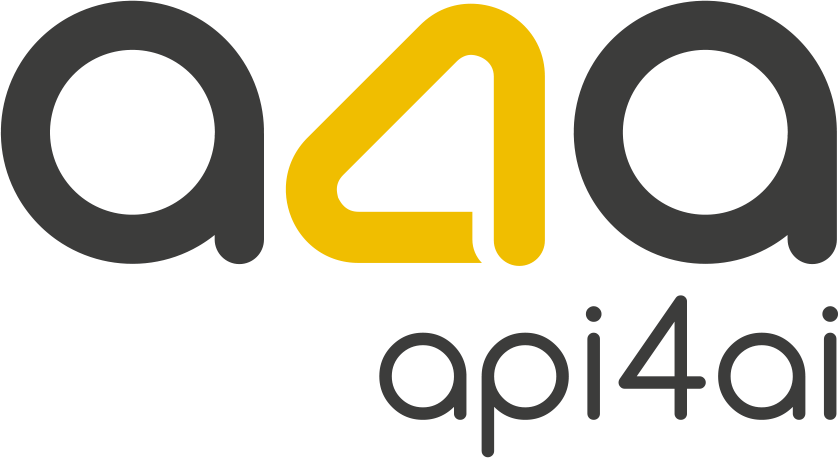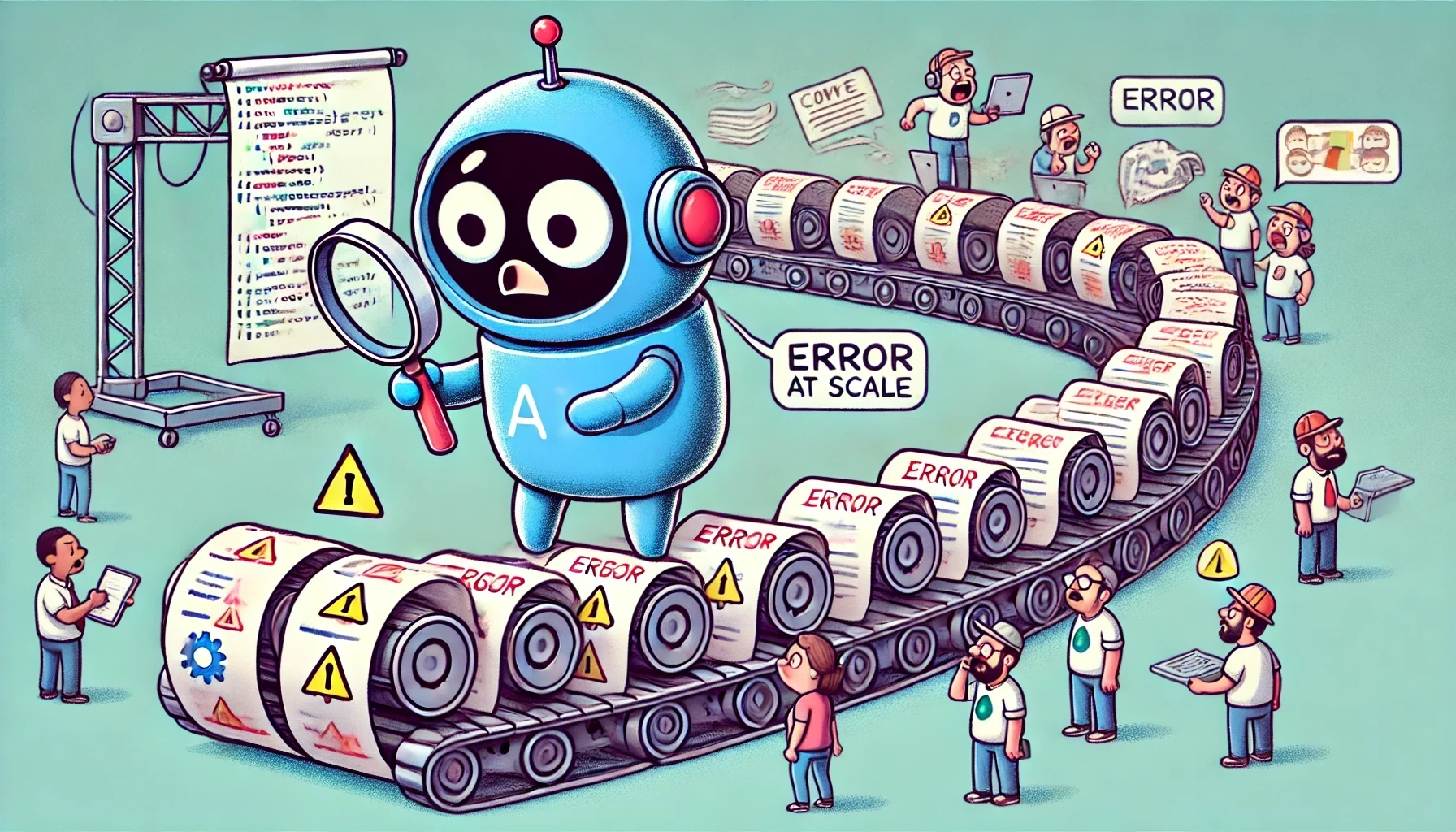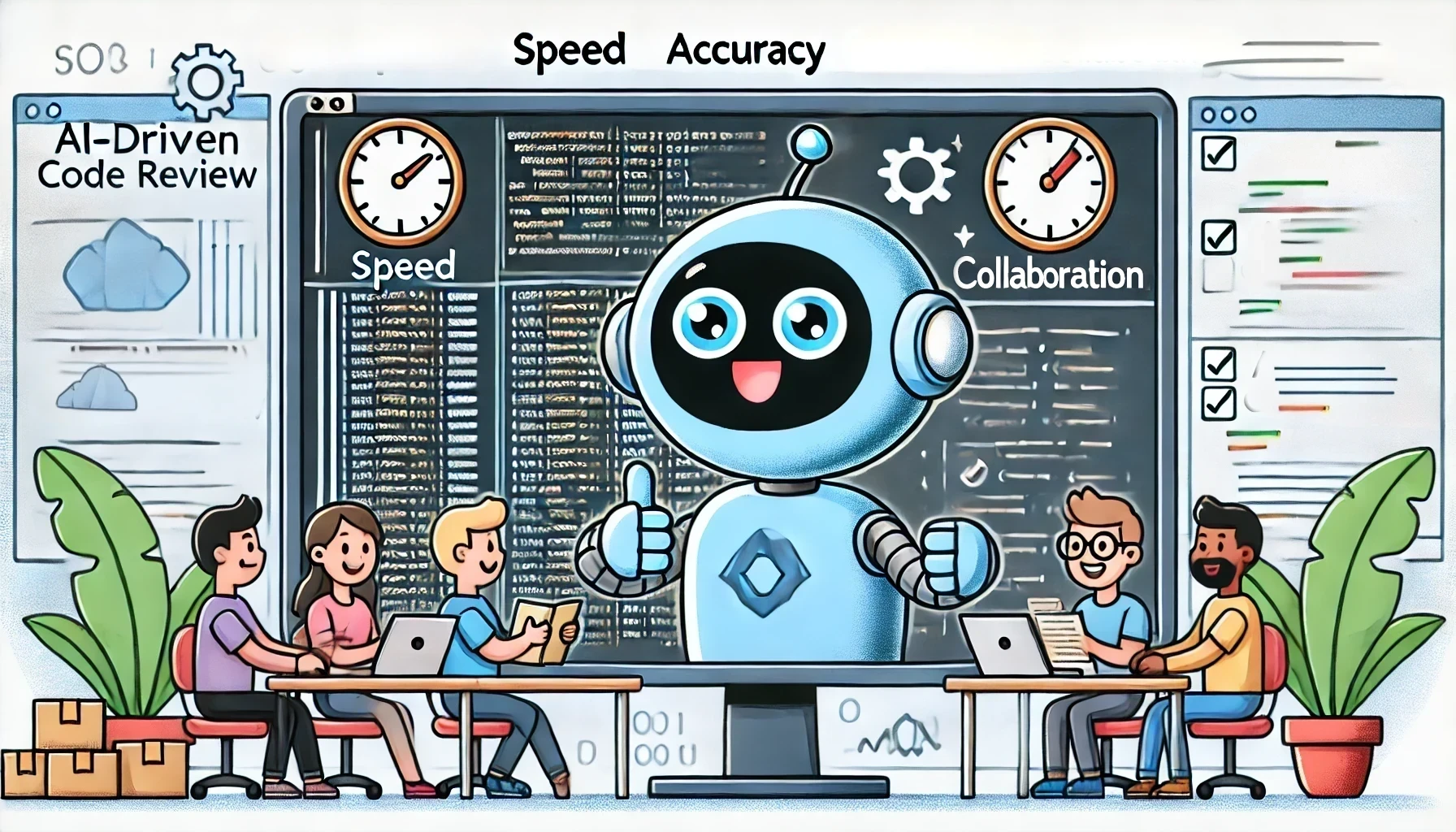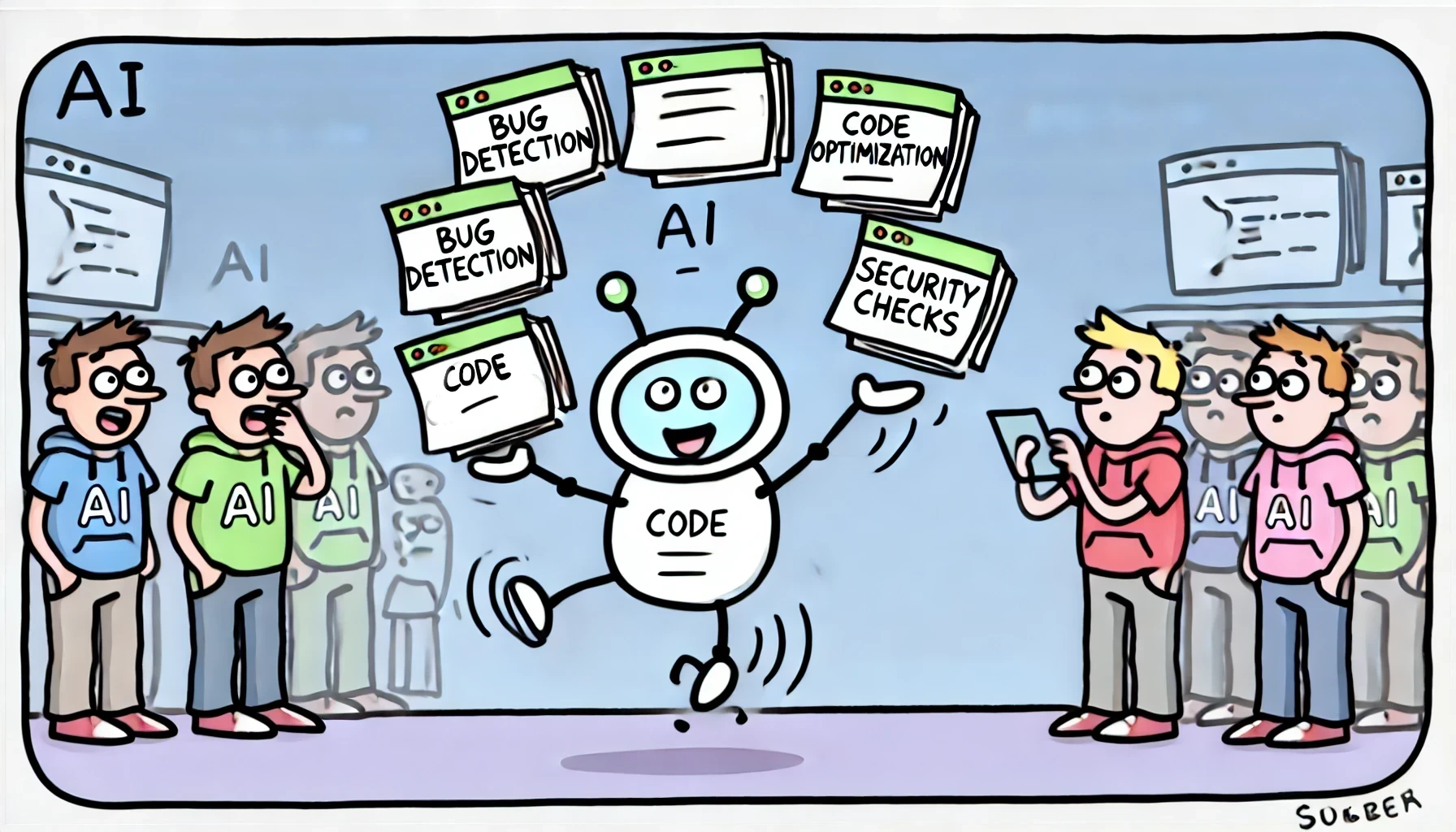AI Code Review for Large-Scale Projects
Introduction: The Challenges of Code Review in Large-Scale Projects
Large-scale projects face unique challenges in maintaining code quality and consistency. As codebases grow, so does the complexity of managing and reviewing code changes. Large projects involve multiple teams, each working on different modules or features, which makes ensuring consistent, high-quality code reviews a formidable task. Traditional manual review processes become increasingly difficult to sustain at scale due to the sheer volume of code changes and the varied expertise required to assess them. This often results in bottlenecks that slow down progress, affecting everything from development cycles to overall productivity.
One of the core challenges in large-scale projects is the need for efficiency. When projects involve thousands of lines of code being updated daily, developers may spend significant time waiting for feedback or sifting through extensive code reviews, delaying critical releases. Without efficient and scalable solutions, code review can quickly turn into a bottleneck, slowing down development cycles, introducing costly delays and increasing the potential for human error. Furthermore, maintaining consistency across reviews is tough, as different reviewers may focus on different aspects of code quality, leading to inconsistent feedback and, sometimes, overlooked issues.
AI-driven code review solutions have emerged as a powerful alternative, capable of automating, accelerating and standardizing the review process. Leveraging advanced large language models (LLMs), AI-based tools can analyze code with remarkable depth and precision, providing quick, high-quality feedback across various programming languages. This capability is especially transformative in large-scale projects where automation, precision and scalability are crucial. AI tools like CRken, a product by API4AI, are redefining code review by integrating directly into workflows, such as GitLab and offering instant feedback on Merge Requests. By automating the code review process, AI solutions enable teams to focus on innovation, improve code quality and streamline their development cycles, unlocking new levels of productivity for large-scale projects.
How AI-Powered Code Review Works for Large-Scale Projects
AI-powered code review has transformed the review process by leveraging large language models (LLMs) capable of understanding complex programming patterns, automating workflows and providing detailed, immediate feedback. This technology is particularly suited for large-scale projects, where the sheer volume of code and the need for consistent, thorough feedback present ongoing challenges. Tools like CRken, an advanced code review API from API4AI, integrate seamlessly into development environments like GitLab, enabling automated, efficient and precise code analysis.
Leveraging LLMs for Code Understanding
At the core of AI-powered code review tools are advanced large language models (LLMs), trained on vast datasets spanning diverse programming languages, styles and patterns. This extensive training allows LLMs to analyze code with deep contextual understanding, recognizing nuanced syntax, logic structures and potential pitfalls across a wide variety of languages, from Python to Java and C++. By processing code in context, LLMs provide highly relevant feedback that goes beyond surface-level syntax checks, addressing code quality, security and maintainability. For large-scale projects with complex, interdependent modules, this contextual understanding is critical. It enables the AI to identify both immediate issues and longer-term concerns that might arise from specific coding practices, making LLM-powered tools ideal for maintaining quality across large, multi-language codebases.
Workflow Automation with GitLab Integration
AI code review tools like CRken are designed to integrate smoothly into the existing development workflows, triggering automatic reviews directly within GitLab. A GitLab Webhook initiates the review process as soon as a Merge Request is opened or updated, setting off CRken’s analysis without requiring manual intervention. This automation ensures that code reviews are consistent and timely, reducing the waiting period for feedback and helping teams maintain momentum in their development cycles. By embedding the review process into GitLab, these tools allow developers to stay within their preferred environment, streamlining the workflow and minimizing task-switching. With reviews occurring automatically upon code submission, teams can rely on a consistent review cadence, enabling faster and more efficient collaboration across large projects.
Automatic Feedback Generation
One of the most impactful features of AI-powered code review is its ability to generate detailed, actionable feedback instantly. AI tools like CRken examine each modified file in a Merge Request, identifying potential issues with code quality, adherence to style guides, security vulnerabilities and even logic errors. This real-time feedback greatly reduces the manual workload on developers and reviewers, who can focus on high-level code improvements and team coordination rather than sifting through code for errors. Additionally, by providing feedback directly in the GitLab Code Review interface, AI-powered tools ensure that comments are contextual and accessible, appearing alongside other reviewer comments. This setup fosters a more collaborative, productive review process, where teams can address issues promptly and integrate improvements without disrupting the workflow.
AI-powered code review tools, particularly those utilizing LLMs and robust automation, bring unprecedented efficiency, scalability and precision to large-scale projects. By integrating seamlessly with platforms like GitLab and generating rapid, in-depth feedback, these tools are transforming code review from a bottleneck into a streamlined, collaborative process that accelerates development and elevates code quality.
Key Benefits of AI-Driven Code Review in Large Projects
As large-scale projects grow in complexity, AI-driven code review offers a transformative solution to maintain efficiency, quality and consistency across codebases. The ability to automate and streamline review processes is particularly valuable for large teams, where managing code quality can otherwise become overwhelming. Here’s a closer look at how AI-powered code review, especially using advanced LLMs (large language models), provides critical advantages.
Precision and Consistency in Code Analysis
In large projects, code quality and security are paramount and AI-powered code review tools bring unmatched precision to this task.
In-Depth Insights: Built on cutting-edge LLM technology, AI-driven code review tools provide deep, contextual insights into code structure, quality, security and functionality. They can detect complex issues beyond syntax errors, including vulnerabilities, potential bugs and logic inconsistencies, which might otherwise go unnoticed. This precise, thorough feedback elevates the code quality in every release.
Consistency Across Reviews: A significant challenge in large projects is maintaining uniformity in code quality across different teams and modules. AI-driven tools deliver consistent, unbiased feedback, ensuring that all code adheres to the same standards, regardless of who writes or reviews it. This level of consistency is crucial in large projects with multiple contributors, reducing technical debt and ensuring high-quality, reliable code across the board.
Support for Multiple Languages
In large-scale projects, teams often work across a range of programming languages. Multi-language support is essential for an effective code review solution and AI-driven tools excel in this regard.
Compatibility Across Stacks: AI-driven code review tools like CRken support popular languages, including Python, Java, JavaScript, Go, PHP, C#, Kotlin and C++, among others. This broad compatibility ensures that AI-powered reviews fit seamlessly into diverse tech stacks, making it possible for teams to rely on a single, unified tool across multiple projects and languages.
Scalability Across Teams and Projects: Large organizations often have distributed teams working on varied projects with different tech stacks. AI-driven code review scales effortlessly, enabling all teams to benefit from a centralized, consistent review process regardless of their programming language. This scalability makes it easier for organizations to manage quality across multiple teams, helping to unify practices across projects and ensuring the whole organization adheres to the same high standards.
Enhanced Productivity Through Process Automation
One of the most transformative aspects of AI-driven code review for large projects is its ability to automate repetitive tasks, reducing bottlenecks and enabling teams to focus on higher-value work.
Faster Code Reviews: By automating the analysis and feedback process, AI-driven tools cut down review times from hours to minutes. This accelerated review cycle enables teams to address issues earlier in the development process, keeping projects on schedule and avoiding lengthy delays that can arise from manual reviews.
Seamless Integration: AI-driven code review tools like CRken are designed to integrate directly into existing workflows, such as GitLab. This seamless integration minimizes disruptions, allowing developers to receive feedback directly within their code review interface. Developers can stay focused on their tasks without the need to switch between tools or platforms, significantly reducing context-switching and boosting overall team efficiency.
In summary, AI-driven code review brings essential benefits to large-scale projects, from providing precise, consistent feedback to supporting multiple languages and boosting productivity through automation. By leveraging AI to streamline and improve the code review process, large organizations can enhance their development cycles, ensure high code quality and ultimately achieve greater project success.
Practical Use Cases of AI-Powered Code Review for Large-Scale Projects
AI-powered code review is reshaping the way large-scale projects maintain code quality, speed up releases and ensure security across distributed teams. Leveraging advanced LLMs, these tools provide quick, consistent and actionable feedback that scales effortlessly across complex codebases. Here’s how AI-driven code review tools like CRken are practically enhancing large-scale projects across various dimensions.
Improving Code Quality and Maintainability
In large projects with multiple contributors, maintaining code quality and readability is essential for long-term success. AI-powered code review tools can automatically enforce coding standards and provide detailed feedback on code style, ensuring consistency across the codebase. By catching issues like inconsistent naming, complex structures, or redundant code, these tools promote cleaner, more maintainable code.
Automated Style and Standard Checks: With instant feedback on coding style and best practices, AI tools ensure that all contributors adhere to project-specific guidelines, improving overall readability and making future modifications easier.
Enhanced Maintainability: In large teams, where different developers work on interconnected modules, maintaining code consistency is key to minimizing technical debt. AI-driven code review supports maintainable coding practices by flagging complex or error-prone code sections, which are then optimized before merging.
Accelerating Feature Releases
In dynamic industries, where rapid feature deployment is critical, AI-powered code review tools enable faster, more reliable code merges by automating the review process. Rather than waiting for manual reviews, which can introduce delays, teams receive immediate feedback on code quality and functionality.
Reduced Time-to-Review: With automated reviews that take minutes, teams can significantly cut down the time required for each Merge Request, accelerating the overall release cycle. This agility enables development teams to quickly implement, review and release new features, keeping up with market demands.
Improved Developer Focus: By automating repetitive aspects of code review, AI tools reduce task-switching, allowing developers to focus on critical tasks without getting bogged down in manual reviews, ultimately leading to faster feature development and release.
Enhanced Security and Compliance
Security and regulatory compliance are critical in industries like finance, healthcare and e-commerce, where code vulnerabilities can have significant consequences. AI-powered code review tools can proactively detect potential security issues early in the development process, before they become serious vulnerabilities.
Early Detection of Security Risks: AI-driven tools analyze code for patterns associated with vulnerabilities, such as SQL injection points or insecure data handling, flagging them in real-time. This early detection allows teams to resolve issues quickly, reducing the risk of security incidents after release.
Supporting Regulatory Compliance: In industries governed by strict compliance standards, AI-powered code review helps ensure that code meets regulatory requirements. By maintaining a consistent review process, teams can confidently align their code with industry standards, facilitating smoother audits and inspections.
Enabling Collaborative Development at Scale
For large, distributed teams, fostering a cohesive development culture is essential. AI-powered code review enables centralized, consistent feedback across teams, bridging the gap between distributed teams and promoting unified coding practices.
Consistent Review Standards: AI-driven tools ensure that feedback is uniform across the board, aligning distributed teams around the same code quality and performance standards. This consistency promotes a collaborative environment where everyone follows the same guidelines, improving code readability and reducing friction between teams.
Improved Cross-Team Collaboration: With all code reviewed to the same standards, cross-functional teams can work together more effectively, sharing a common understanding of project code quality and functionality. This shared perspective minimizes misunderstandings and accelerates progress, as developers across different teams can understand and build upon each other’s work more efficiently.
AI-powered code review tools bring vital enhancements to large-scale projects by supporting code quality, accelerating releases, strengthening security and fostering collaboration. These practical benefits make AI-driven code review an essential tool for any organization looking to scale efficiently while maintaining high standards for security and performance.
How CRken Addresses the Needs of Large-Scale Projects
CRken, API4AI’s advanced code review tool, is designed to tackle the specific challenges of large-scale projects by delivering precision, speed and integration. Leveraging state-of-the-art large language models (LLMs), CRken brings a new level of accuracy and efficiency to code review, enabling teams to streamline their processes, optimize productivity and maintain high-quality standards across complex codebases. Here’s how CRken meets the demands of large-scale projects.
Built on Cutting-Edge LLM Technology
At the core of CRken is its powerful LLM-driven architecture, enabling it to understand and analyze code with impressive depth and context-awareness. Unlike rule-based or traditional code analysis tools, CRken’s LLMs can identify subtle issues in code, understand logical structures and provide insights into areas like security, functionality and maintainability. This capability is invaluable in large projects, where the variety of contributors and complexity of codebases require consistent, nuanced feedback.
Context-Aware Analysis: CRken’s language models interpret code in context, identifying not only syntax issues but also potential logic flaws, anti-patterns and optimization opportunities.
Precision Across Languages: CRken supports a broad array of programming languages, including JavaScript, Python, Go, PHP, Java, C#, Kotlin and C++, making it a versatile solution for diverse development environments. Its language flexibility is essential for large organizations, where different teams may work with different tech stacks.
Automatic Merge Request Feedback in Minutes
CRken’s integration with GitLab is a game-changer for teams handling high volumes of code. Whenever a Merge Request is opened or updated, a GitLab Webhook triggers CRken to automatically review each modified file, delivering detailed, targeted feedback in minutes. This automation dramatically accelerates the review process, allowing teams to make improvements immediately and keep development cycles on track.
Real-Time Feedback: With CRken, teams receive immediate feedback on code quality, style and potential issues right within the GitLab interface. This rapid turnaround ensures that developers can act on feedback promptly, reducing the risk of code flaws progressing into production.
Streamlined Integration: CRken’s feedback appears directly in GitLab’s Code Review interface, alongside other comments from team members. This seamless integration keeps the review process organized and allows developers to address both AI-driven and human feedback in one place, minimizing disruption.
Optimizing Developer Efficiency and Reducing Downtime
Large-scale projects require efficiency and focus and CRken’s quick, reliable feedback is key to maintaining developer productivity. By automating routine aspects of code review, CRken helps reduce downtime caused by waiting for manual reviews and minimizes task-switching, allowing developers to focus on core tasks.
Minimized Task-Switching: The automatic, in-context feedback provided by CRken means developers can quickly address code issues without leaving their environment or waiting for manual reviews. This continuity of focus enhances productivity, as developers spend less time moving between tasks.
Accelerated Development Cycles: CRken’s instant feedback helps teams move through the development pipeline faster, reducing feature release times by up to 30%. With less time spent on repetitive review tasks, teams can meet deadlines more consistently and maintain a steady development pace.
CRken’s powerful LLM-based analysis, seamless integration with GitLab and real-time feedback make it an indispensable tool for large-scale projects. By delivering precision, efficiency and consistency, CRken empowers teams to achieve faster, higher-quality releases, setting a new standard for AI-driven code review in complex development environments.
The Future of AI-Powered Code Review for Large Projects
As AI-driven code review continues to evolve, its role in large-scale projects is set to become even more transformative. Tools like CRken are already showcasing the potential of LLM-powered analysis, integration and automation, but the future holds even more exciting developments. Here’s a look at the directions AI code review is expected to take and its potential impact on development pipelines, emerging trends and developer roles.
Scaling AI in Development Pipelines
AI-powered code review is poised to become a standard practice in development pipelines, especially in large-scale projects that demand efficient and scalable quality control. As teams grow and codebases become more complex, the limitations of traditional review processes become increasingly evident. AI-driven tools offer a solution that can easily scale, providing consistent, high-quality feedback across diverse programming languages and frameworks.
Standardization Across Large Teams: With AI review tools that scale effortlessly across projects, organizations can ensure all teams receive consistent feedback, maintaining uniform quality standards across products.
Efficient Management of Complex Codebases: AI code review is especially valuable in large projects with intricate interdependencies. By automatically evaluating changes and analyzing dependencies, AI tools help teams navigate complex codebases with ease, ensuring no issue goes unnoticed even as code grows.
Emerging Trends
The rapid advancement of AI technology will likely lead to even more sophisticated capabilities in code review. New trends are set to enhance the utility of AI tools, making them more context-aware, security-focused and tightly integrated into development workflows.
Greater Contextual Understanding in LLMs: With ongoing improvements in large language models, AI-driven code review tools will be able to assess code within its broader context, understanding the interplay between modules and functions. This deeper contextual awareness will allow for even more relevant, targeted feedback, increasing the overall quality of the review.
Enhanced Detection of Security Vulnerabilities: Future AI models are expected to bring advanced vulnerability detection, recognizing more subtle security risks and adhering to industry-specific compliance standards. This evolution will be particularly beneficial in regulated industries, where compliance is essential.
Tighter Integration with CI/CD Tools: The integration of AI code review with CI/CD pipelines will enable continuous code quality monitoring throughout the development lifecycle. By providing feedback at each step, AI will help teams maintain high standards without disrupting the flow, making continuous delivery of high-quality code easier and faster.
Evolving Developer Roles with AI Assistance
As AI becomes an integral part of the code review process, the role of developers is set to evolve. Rather than focusing on repetitive review tasks, developers can dedicate their time to more creative and impactful work, such as feature development, problem-solving and architectural improvements.
Enhanced Collaboration and Creativity: With AI handling routine review tasks, developers are free to collaborate on high-level challenges and innovative solutions. This shift allows them to contribute more meaningfully to project goals and product vision.
Focus on High-Impact Development: AI-driven code review streamlines processes, giving developers the bandwidth to focus on building better software. They can explore creative solutions, improve code efficiency and deepen their expertise without being bogged down by repetitive checks.
The future of AI-powered code review is promising, with advancements that will further integrate it into development pipelines, enhance security and context-aware capabilities and redefine developer workflows. For large-scale projects, this evolution signals a more efficient, secure and collaborative future—where code review is not just a checkpoint but a catalyst for innovation and productivity.
Conclusion: Unlocking New Levels of Efficiency in Large-Scale Projects
AI-powered code review has emerged as a game-changer for large-scale projects, transforming code review from a potential bottleneck into a streamlined, productivity-enhancing process. With advanced tools like CRken, which leverages cutting-edge LLM technology, teams can achieve new levels of efficiency, consistency and security. The automation capabilities of AI-driven code review not only accelerate feedback cycles but also improve the quality of code by providing precise, unbiased insights across multiple programming languages and development stacks. This shift allows developers to focus on high-impact work, reduces feature release times and ensures that code quality standards are met across complex projects.
For companies managing large-scale projects, integrating AI-powered code review solutions presents a unique opportunity to optimize development cycles, maintain code quality and foster more collaborative and productive workflows. As the technology advances, AI-driven tools will continue to evolve, offering even more sophisticated insights and tighter integration with development pipelines. Embracing AI in code review is more than a productivity enhancement—it's a strategic investment in the future of software development.
Now is the time for organizations to explore the potential of AI-driven code review. By adopting tools like CRken, teams can unlock the full benefits of automation, scalability and advanced code analysis, setting the stage for efficient, high-quality development at scale.





